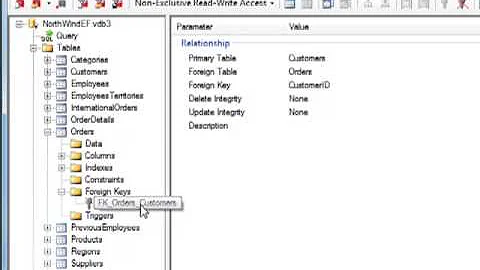Entity Framework: Check all relationships of an entity for foreign key use
Solution 1
Just let it fail. If the entity has many relationships, that verification could be really heavy.
public bool TryDelete(int id)
{
try
{
// Delete
return true;
}
catch (SqlException ex)
{
if (ex.Number == 547) return false; // The {...} statement conflicted with the {...} constraint {...}
throw; // other error
}
}
Solution 2
You can use Reflection for this (if you don't want use "Fail Delete On SQL") I write this because I dont want to DELETE Entity, just want to know if its related to any or not !
public static object GetEntityFieldValue(this object entityObj, string propertyName)
{
var pro = entityObj.GetType().GetProperties(BindingFlags.Public | BindingFlags.Instance).First(x => x.Name == propertyName);
return pro.GetValue(entityObj, null);
}
public static IEnumerable<PropertyInfo> GetManyRelatedEntityNavigatorProperties(object entityObj)
{
var props = entityObj.GetType().GetProperties(BindingFlags.Public | BindingFlags.Instance).Where(x => x.CanWrite && x.GetGetMethod().IsVirtual && x.PropertyType.IsGenericType == true);
return props;
}
public static bool HasAnyRelation(object entityObj)
{
var collectionProps= GetManyRelatedEntityNavigatorProperties(entityObj);
foreach (var item in collectionProps)
{
var collectionValue = GetEntityFieldValue(entityObj,item.Name);
if (collectionValue != null && collectionValue is IEnumerable)
{
var col = collectionValue as IEnumerable;
if (col.GetEnumerator().MoveNext())
{
return true;
}
}
}
return false;
}
NOTE that : Context must not Disposed and Proxy Must Be Enabled AND KNOW THAT IT WILL GET ALL RELATED RECORD TO MEMORY (IT'S Too Heavy)
Related videos on Youtube
BenC3
Updated on September 15, 2022Comments
-
BenC3 over 1 year
I have an entity, let's call it
CommonEntitythat has a primary key used as a foreign key in many other entities. As the application is developed these links will continue to grow.I'd like a way to see if
CommonEntitycan be safely deleted (i.e. it's not used by any other entities).I realise I can do
if(!ce.EntityA.Any() && !ce.EntityB.Any() ... && !ce.EntityN.Any()) { //Delete }but I'm hoping for a way to just check all of the relationships automatically, as I don't love the idea of having to come back and change this code manually every time we add a new relationship. Perhaps there is something in EF4+ that I'm not aware of?
I thought it might be possible to use a transaction scope to just try and delete the object and roll it back if it fails, but I wasn't sure if there were any adverse side effects with this approach.
Is there a better approach?
EDIT: Looks like VS2012 has used EF5 even though the project is .Net 4, so it has created the model with POCOs even though it was generated from a DB.
-
BenC3 over 11 yearsIf I let it fail, will it automatically roll back any successful cascading without a transaction scope?
-
BenC3 over 11 yearsFound the answer - SaveChanges() uses a transaction, so any failures will be rolled back: msdn.microsoft.com/en-us/library/bb336792.aspx
-
Gwasshoppa about 8 yearsThis is a really good way I think, instead of doing
MyClass.Any() || MyOtherClass.Any()etc etc. The one thing I added was an Ignore attribute to allow you to decide to Not Include thePropertyin theHasAnyRelation()TheGetManyRelatedEntityNavigatorProperties()looks like this...var props = entityObj.GetType().GetProperties(BindingFlags.Public | BindingFlags.Instance).Where(x => x.CanWrite && x.GetGetMethod().IsVirtual && x.PropertyType.IsGenericType && (x.GetCustomAttribute(typeof (IgnoreIsDeletableAttribute)) == null) ); -
gezanoletti almost 6 yearsLeting it fail is the best solution for me. If you checks for all relations you can generate circular dependencies with other subsystems. There's a drawback, it's hard to show to the user which relation is causing the error.
-
dnxit over 5 yearsIt'll only check if it has any navigation property or not it will not check if it has any dependent data or not.
-
Krishna over 4 yearswhat if ondeletecascade is turned on. it wont fail then would it?







